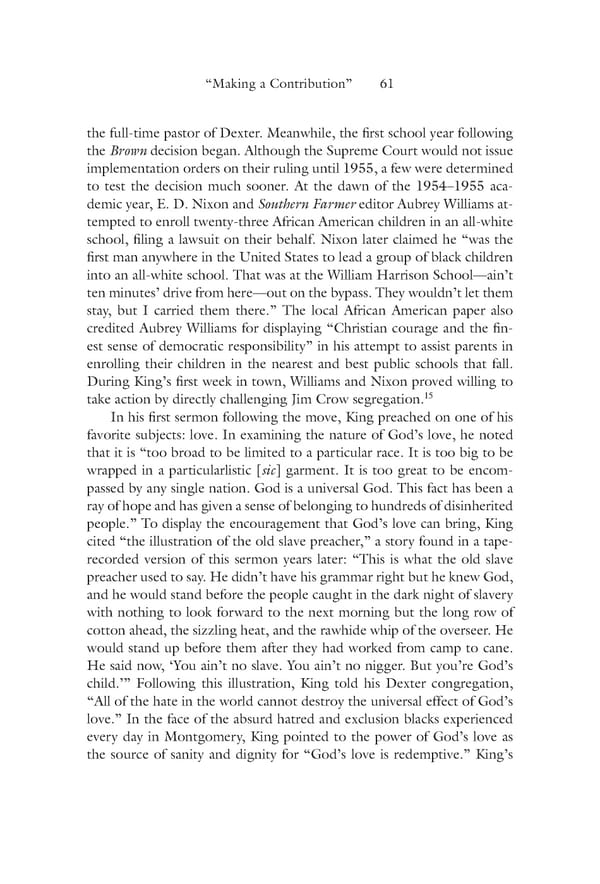“Making a Contribution” 61 the full-time pastor of Dexter. Meanwhile, the first school year following the Brown decision began. Although the Supreme Court would not issue implementation orders on their ruling until 1955, a few were determined to test the decision much sooner. At the dawn of the 1954–1955 aca- demic year, E. D. Nixon and Southern Farmer editor Aubrey Williams at- tempted to enroll twenty-three African American children in an all-white school, filing a lawsuit on their behalf. Nixon later claimed he “was the first man anywhere in the United States to lead a group of black children into an all-white school. That was at the William Harrison School—ain’t ten minutes’ drive from here—out on the bypass. They wouldn’t let them stay, but I carried them there.” The local African American paper also credited Aubrey Williams for displaying “Christian courage and the fin- est sense of democratic responsibility” in his attempt to assist parents in enrolling their children in the nearest and best public schools that fall. During King’s first week in town, Williams and Nixon proved willing to take action by directly challenging Jim Crow segregation.15 In his first sermon following the move, King preached on one of his favorite subjects: love. In examining the nature of God’s love, he noted that it is “too broad to be limited to a particular race. It is too big to be wrapped in a particularlistic [sic] garment. It is too great to be encom- passed by any single nation. God is a universal God. This fact has been a ray of hope and has given a sense of belonging to hundreds of disinherited people.” To display the encouragement that God’s love can bring, King cited “the illustration of the old slave preacher,” a story found in a tape- recorded version of this sermon years later: “This is what the old slave preacher used to say. He didn’t have his grammar right but he knew God, and he would stand before the people caught in the dark night of slavery with nothing to look forward to the next morning but the long row of cotton ahead, the sizzling heat, and the rawhide whip of the overseer. He would stand up before them after they had worked from camp to cane. He said now, ‘You ain’t no slave. You ain’t no nigger. But you’re God’s child.’” Following this illustration, King told his Dexter congregation, “All of the hate in the world cannot destroy the universal effect of God’s love.” In the face of the absurd hatred and exclusion blacks experienced every day in Montgomery, King pointed to the power of God’s love as the source of sanity and dignity for “God’s love is redemptive.” King’s
 Becoming King: Martin Luther King Jr. Page 81 Page 83
Becoming King: Martin Luther King Jr. Page 81 Page 83